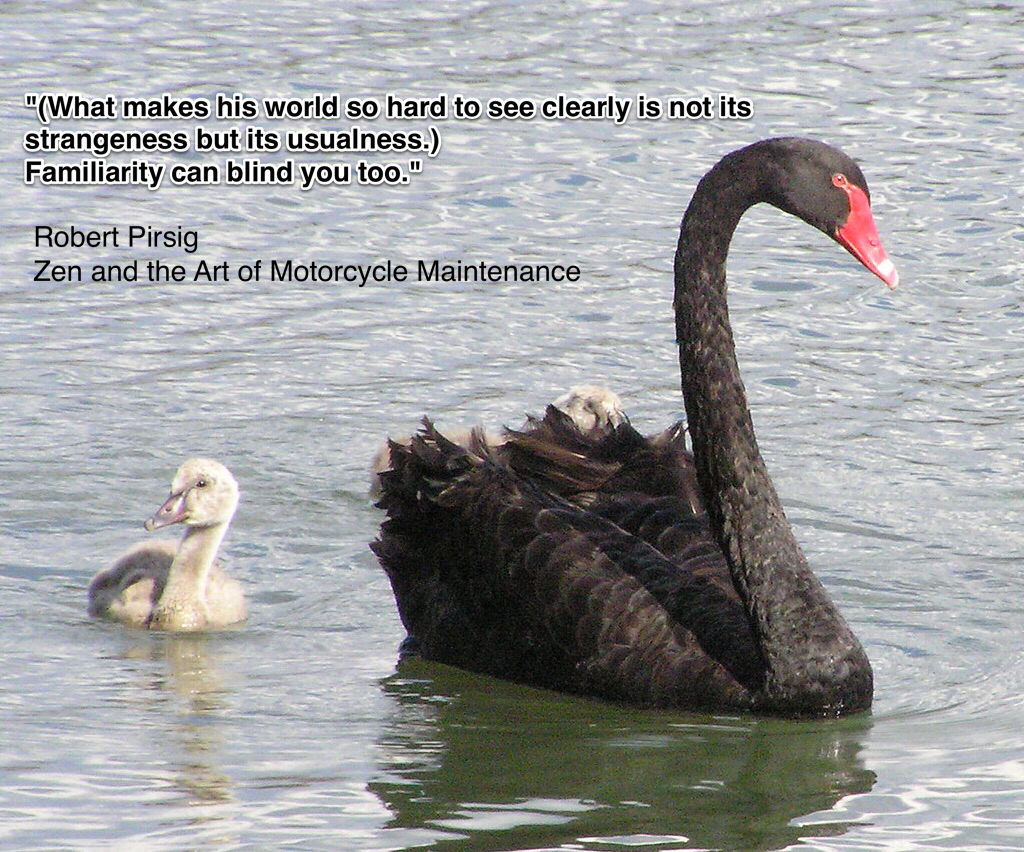
Here’s the thing about Black Swans, they are not born that way. As that little guy in the picture (credit here) grows into an adult his feathers change colour.
There is a chance we are all born with the capability to perceive the chance of Black Swan events. But we have taught ourselves not to see them. Some call it Wilful Blindness – others might call it the religion of common practice or accepted thinking.
I have a recorded webinar on the subject from BCAW 2013 if you are interested.
There were some intersesting findings from the polls in that webinar, the main issue that hit me was we talk often in this indistry about Black Swan events, but almost nodody has read the work of Taleb who popularised the concept. Instead they are simply repeating the (often incorrect) way they have heard others use the concept.
We are even wilfully blind on what a Black Swan is or is not.
Today you are probably seeing much the same thing happen with respect to resilience.
In the webinar I suggested a couople of strategies to counter blindness;
- Unvarnished truth and unfettered exploration
- Critical thinking, and
- Courage to speak up.
To the best of my knowledge I had not heard about Kanter’s Six keys to leading positive change at the time delivered that session, but I talked about a couple of similar elements of her keys based on my own observation of working and practicing in organisations. Have you seen the same things? Drop me a note with your thoughts, would love to discuss this with you.
- Speak up – sometimes that takes courage, especially when you may need to report a “bad news” story or challenge conventional wisdom or accepted practice.
Here is a really good book that anybody interested in resilience should read, it is called Addicted to Performance, by John Bircham and Heather Connolly. It is a series of case studies of what can happen when people don’t speak up or simply accept that something is broken and continue to work around the issue.
- A second part of Speaking Up is related to Critical thinking – or as Kanter expressed it in a more practicial manner – shaping the agenda and framing the issue to help people think about issues differently and give ideas for action.
Familiarity does not just breed contempt, it breeds vulnerability.
As an example, this article (How Reframing a Problem Unlocks Innovation) contains a great quote from Einstein, plus a lot of other useful advice on this skill of reframing.
If I had an hour to solve a problem and my life depended on the solution, I would spend the first fifty-five minutes determining the proper question to ask, for once I know the proper question, I could solve the problem in less than five minutes. (Einstein)
Too often we dont spend enough time trying to understand the correct quesiton, or we lack the courage to pose that question.
Here is another article you may find helpful in identification of the skills that we need to develop to encourage reframing issues and new thinking.
This article about using Social Media to reframe an issue is a different, but contemporary, view on the challenge – but given that everybody thinks their criris response is going to (magically) use Social Media effectively I guess you may already have built these indeas into your crisis/incident repsonse thinking.
Plenty to get you thinking for a few days, and reframing this idea of resilience I hope.
I have two requests if you have time over the coming week. First if you have not shared your view of the future I would be grateful if you had time to contribute to my survey.
Secondly I am keen to understand how people want to learn and develop these skills such as reframing and other non-technical skills that need to be mastered to enable resilience? If you can spare the time please drop me a line and let me know how you would like to learn – the old ways of training rooms and formal courses, on the job, on demand/on line – there are so many options and preferences.
Until next time, stay the course, and remember that resilience is a journey not a destination.
Ken Simpson
Curator-in-Chief